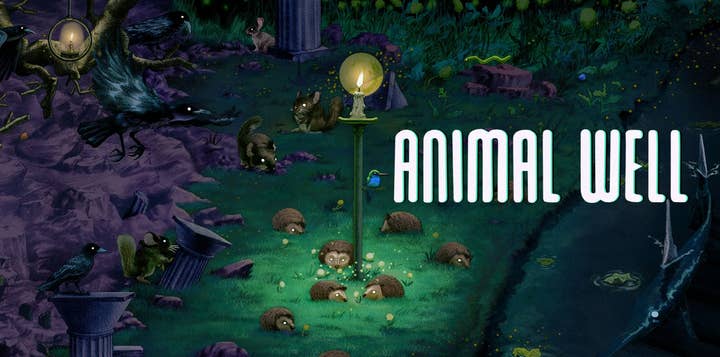The closure (or close to closure) of Humble Games was yet one more brutal headline in what has been a bleak 18 months for indie games publishers
We have seen collapsing share costs, redundancies, a discount in games being signed and full firm closures. In fact, publishers are caught up in the similar nightmare that the complete games business has been coping with – a drop in sport income blended with over-investment and quickly rising prices. Nonetheless, there are additionally some basic (and doubtlessly everlasting) shifts in the market which can be making it tougher for publishers to compete.
“I’ve been in publishing for nearly ten years and it’s all the time been unsure,” says Simon Byron, who is presently MD of Yogscast Games. “You may by no means predict precisely how a sport will carry out earlier than it’s out. You may have a way, certain, however precisely forecasting a sport’s gross sales is unimaginable – I’ve definitely by no means acquired it spot on. And that’s difficult for specific firms who’ve pressures to offer certainty to its shareholders.
“What we’re seeing at the second are large adjustments in the market, the place forecasting fashions haven’t caught up with oversaturation, the impression of subscription companies and the prevalence of aggressive discounting. Firms that overstretched throughout occasions of loads now discover themselves in a world the place extra agile firms are transferring in and performing higher.
“I’m nonetheless tremendously enthusiastic about the market. There are nice games launching all the time, and breakout hits popping off week after week. It’s not that folks aren’t shopping for games – removed from it. It’s that the foundations some firms have constructed their operations upon depend on games promoting an unrealistic quantity. Many of these firms are nonetheless very worthwhile, which is what makes it much more heartbreaking.”
Unrealistic expectations is one thing that got here up a number of occasions with the companies I spoke to. Snow Rui, who is CFO and president of publisher Hooded Horse, cites inflated expectations as a problem for firms with demanding traders and shareholders.
“So much of the cuts and unrest come from public firms’ ‘shifting company priorities’,” she observes. “I consider there’s some inherent rigidity between public firms’ want to have predictable income trending properly at quarterly and annual intervals, and the actuality of sport improvement which is basically unpredictable each in timing and in outcomes.”
“There’s some inherent rigidity between public firms’ want to have predictable income, and the actuality of sport improvement”
Snow Ruie, Hooded Horse
The unpredictability has seen some publishers turn into risk-averse, and on the lookout for extra predictable and dependable sources of income.
John Clark, who has held a collection of publishing roles at Sega, Tencent and was most not too long ago CEO of Curve, notes: “Publishers are re-balancing the stability and danger parts inside their companies. Extra predictable catalogue and lengthy tail games efficiency underpins stability for publishers whereas, the danger is largely investing in new IP and new games of current IP.
“Overinvestment in new games and, in some circumstances, beneath supply in high quality has been an element [in the situation facing publishers]. This, along with the continued sturdy efficiency of main titles and growing quantity of new games has created the best atmosphere we’ve seen. This has challenged publisher experience when releasing games and impacted the capacity and confidence to spend money on new games.”
One indie developer stated to me final month that their technique with their upcoming launch was to “put themselves in the finest locations to get fortunate”. He had noticed that though there had been loads of indie hits in latest months, there seemed to be no “rhyme or purpose to it”. So we requested our publishers whether or not recognizing potential hits has turn into tougher.

“That’s an unimaginable process, actually,” admits Nigel Lowrie, co-founder and chief advertising officer at Devolver.
“Most individuals take a look at varied indicators to elucidate success or a close to miss after the truth after which say all the writing was on the wall however nobody actually is aware of forward of time. Definitely you possibly can take a look at what’s been profitable as of late and verify off varied containers. However in the finish there are such a lot of variables it does really feel fairly unimaginable to essentially predict what is going to discover success. And I believe that performs out when games that appear to have every thing going for it falter whereas games most didn’t observe resulting in launch go nuts.
“In the finish it’s about discovering one thing compelling that provides an viewers a novel expertise and connecting with that viewers by any means vital. There are some nice indicators like wishlists, protection information, and whatnot however that is all stifled a little bit bit if you set a sport stay and begin asking for individuals’s time and cash.”
Byron agrees: “It’s the nature of the enterprise that gross sales will continually shock, each by overperforming and underperforming towards expectations. However that doesn’t assist when operating a enterprise, so it’s comprehensible that we cling on to any pre-launch metrics we will.
“However publishing isn’t a science. And there’s an actual hazard after we deal with it as such, notably after we ascribe worth to pre-launch wishlists and the concept there’s a quantity you ‘ought to’ have and a variety of what gross sales you possibly can anticipate from these wishlists.
“I used to be speaking to at least one publisher final yr on the topic of wishlists. They informed me they received’t launch a sport except it has over a selected quantity. I informed them what number of we had after we launched PlateUp! and I used to be informed that wasn’t sufficient. We bought over 200,000 models in the first month, which was considerably greater than predicted. They usually subsequently issued a revenue warning.”
“Publishing isn’t a science. And there’s an actual hazard after we deal with it as such”Simon Byron, Yogscast
Byron provides that neither of them have been proper on how properly the sport would do, however that focusing an excessive amount of on a wishlist quantity could possibly be counter-intuitive, as a result of for those who’ve acquired a superb one, you would possibly loosen up extra.
“Whereas the fact is you might want to stay hungry by launch and past,” he says. “Given how straightforward they are often to affect, I discover wishlists fairly a ‘chilly’ metric. Certainly, a lot of the analysis round conversions ignores the high quality of the sport. At Yogscast Games, we a lot choose how gamers are partaking with our games in additional intimate methods, which is why median playtime on demos and playtests is the key metric for us, adopted by exterior progress on platforms like Discord. When you can see a sport gaining traction exterior your core circles, that’s a much bigger signal of success than some magic wishlist quantity.”
Devolver’s Lowrie provides that though it could appear counterintuitive, danger aversion is truly the riskier strategy.
“These which can be keen to experiment and stay agile will discover their hits and construct an engaged viewers,” he says. “Taking part in it protected isn’t going to be very protected in any respect.”
In the end, the market has shifted to some extent the place some of the outdated methods adopted by the extra established publishers merely don’t work, and that favours some of the specialists which have not too long ago emerged on the scene.
“Comparatively new publishers similar to Kepler and Hooded Horse are making a powerful impression, it’s refreshing to see,” Clark says. “They appear to be properly structured, with smaller groups, near the games and builders, with a really clear understanding of their area of interest.
“Referring to my earlier level of balancing stability and danger, publishers who skilled a major progress part earlier than hitting the corrective impression of latest years, are transitioning. Newer and smaller publishers have been capable of research the market in several methods. They will construct a publishing enterprise from a distinct place to begin.”

Yogscast’s Byron continues: “The market has undergone such fast change that we’re nonetheless making an attempt to determine how the varied ecosystems work together with one another. Gamers have a lot content material obtainable – typically at no cost, pennies or as half of a subscription – that the outdated fashions now not apply.
“The era of the generalist indie publisher is over. Publishers actually need to have a centered providing, one thing they carry that may’t be replicated by anybody else. We’re already seeing a shift, simply take a look at the emergence of specialist publishers and labels who actually deal with specific sectors. They appear to be performing higher than these with no specific style of experience. It’s a lot more practical to construct a group round a publishing identification slightly than throughout a set of disparate games.”
It appears bleak, however all our publishers observe that there have been quite a few successes by self-publishing, which is turning into an more and more viable path for indie groups.
“Self-publishing and the data wanted to do it properly have by no means been extra obtainable,” notes Hooded Horse’s Rui. “Publishers will actually must show their worth and provide good phrases, as self-publishing is not a foul various proper now, and that’s as issues ought to be.”
Lowrie agrees: “Self-publishing is a implausible choice for these that may and wish to deal with all of it themselves. There’s been an immense quantity of success by self-publishing the previous few years and it’s inspiring to look at.
“The challenge is there are extra builders and tasks than there are sources to assist them and finally solely a lot cash and – perhaps extra importantly – time for gamers to help these tasks.”
“I genuinely consider that this chaos will lead to a brand new era of creativity.”Nigel Lowrie, Devolver
So what does the future maintain for the indie publishing scene? All of these we spoke to say that there’s no going again to how issues have been.
“There is a stage of everlasting change,” Clark says. “Organisational disruption is leading to glorious expertise being obtainable in the market. We are going to see and are seeing new publishers beginning and creating companies in ways in which they wouldn’t in any other case have executed so.”
And certainly, it’s the formation of new, artistic publishers and studios that finally gives hope for these working inside the indie scene.
“It could actually see that the unlucky culling down of studios and publishers will proceed for a bit longer,” Lowrie concludes. “However from these ashes I’d anticipate to see new small studios full of proficient builders from all areas of the industries studying from the errors of their former executives and taking measured, artistic dangers to proceed to push the medium ahead into sudden instructions.
“It seems like there is a class of bigger firms which have most likely turn into too huge to take actual artistic dangers – for those who even wish to name it a danger – and can proceed to fall again on properly trodden territory they know properly and may promote to their current audiences.
“These smaller studios will create new sub-genres that get away and people danger averse bigger firms will observe swimsuit with their variations after. We’ve seen it with battle royales, occasion royales, and so on. and I’ve little question we’ll see a rush of AAA takes on games like Deadly Firm and Pacific Drive.
“It’s little question a fairly darkish time on the sport making aspect of issues however I genuinely consider that this chaos will lead to a brand new era of creativity.”
